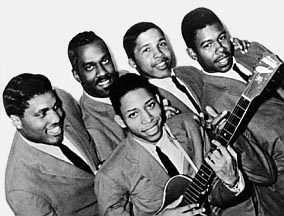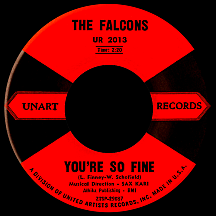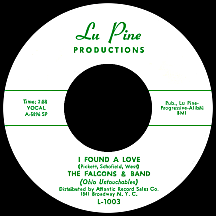THE FALCONS
You're So Fine
It's hard not to be a little befuddled when discussing The Falcons, the late '50s-early '60s R&B quintet from Detroit of "You're So Fine" fame. There were several other groups with the same name, one based in New York with credited lead singer Goldie Boots that recorded as early as 1951 for the Regent label and a couple of years later for Savoy, another around 1954 in Los Angeles with Candy Rivers, waxing sides for the Flip and Cash labels, and a Chicago-based outfit that had one release on Falcon Records in 1957, then ditched the gimmick and surfaced as The Lyrics on Falcon parent label Vee-Jay...and there were more still, about which little is known. Then we've got The Fabulous Playboys, who kept the Falcons name going between 1963 and '70, but they're part of the story. What the bird-branded Motor City group had over these others, besides a handful of hit singles, is the impressive talent found among its ranks. No less than four great lead singers, who gave the act an ever-changing sound over the years, went on to considerable success post-Falcons, three as solo artists and one as a member of three different hitmaking groups!
The Falcons formed in 1955 under manager Robert West's watch as a mixed-race quartet with West's nephew Eddie Floyd, originally from Montgomery, Alabama, taking lead vocal duties, Arnett Robinson covering the second tenor spot and Willie Schofield the big bass voice, all of them African-American; white singers Bob Manardo and Tom Shetler sang tenor and baritone, respectively. West arranged a recording session in 1956, resulting in the poppish "Baby That's It," released that summer on Mercury. Robinson left for personal reasons around the time Manardo and Shetler joined the military, putting West on the prowl for fresh talent. Enter Joe Stubbs (the brother of fledgling Four Tops lead singer and future star Levi), Bonny "Mack" Rice of Clarksdale, Mississippi, who answered an ad West had run in a local newspaper, and a guitar player, Lance Finney. This lineup stayed together for several years.
Singles came out in '57 and '58 on the small Silhouette and Kudo labels before the group landed what seemed to be a big break with Chess Records, though nothing they recorded for the company was released. Robert West took matters into his own hands, starting the Flick label strictly for the purpose of producing, and promoting, Falcons records. "You're So Fine" (penned by Finney and Schofield) was recorded in early 1959 with orchestra leader Isaac "Sax" Kari arranging (and eschewing any orchestral contribution) at Jack and Devora Brown's Fortune Records studio, a bare-bones setup in Detroit that lent itself to unique acoustics considered sub-par by some in the business (though fantastic stuff by the likes of The Diablos and Andre Williams came out of that room!), the result a magically crude, claustrophobic, immediately compelling piece with a jagged lead vocal by Stubbs unencumbered by enhancement of any kind.

West pressed the record on Flick, word spread quickly, the track impacted locally and he cut a deal for national distribution through United Artists. Issued on the Unart imprint, it hit the national charts in April, handily avoiding confusion with "So Fine," a much different (but great) developing hit by Jersey group The Fiestas. The Falcons disc reached the top 20 in July while having a red-hot run in the R&B top ten, hanging tight at number two for a few weeks (understandably unable to topple giants like "Personality" by Lloyd Price and "What'd I Say" by Ray Charles). UA matched the birdmen with pop producer Billy Mure and switched them to the main label; copycat follow-up "You're Mine" (written by Dave Braithwaite and Eddie Powell) briefly hit the charts in October. West's contract allowed him some leeway and he took advantage with "You Must Know I Love You," a typically rougher Flick production that didn't sell, confirming the advantage in having a major company to handle the promotion end. They found time to rework some of the older tracks for Chess and one of these, "Just For Your Love," went top 30 R&B in December (United Artists didn't squawk, probably assuming it was just a reissue). For reasons unclear, the single appeared on Anna Gordy's Anna Records (distributed by Chess) shortly thereafter.
UA's Don Costa began producing the group with string arrangements and glossier overall production values. "The Teacher," another Braithwaite-Powell tune, took them further from their original concept (Stubbs' delivery being quite different than his lead on "You're So Fine"), but it was well-suited to the transition between rhythm, blues and doo wop and what would soon be called soul music, and landed in the R&B top 20 in August 1960. But Joe Stubbs was restless and quit; his replacement, Wilson Pickett, who'd left his home in Prattville, Alabama as a teenager to live with his father in Detroit, stumbled upon the Falcons at just the right moment. The other four weren't sold on him at first, his blues shouting style a major departure from Stubbs' approach, but his presence worked to their advantage over the next couple of years.
"Pow! You're in Love" (a ditty written by Sam Cooke) was Pickett's debut with the group, his vocal delivery somewhat subdued. Its lack of sales-"pow" likely had little to do with UA's decision to drop the act in early '61 at the end of their two-year contract. West started a new label, Lu Pine (sometimes printed on 45s as Lu-Pine) and out came one of the wildest things ever recorded by an R&B combo; highlighted by Pickett's shriekingly fierce vocal performance, "I Found a Love" set a high bar for future soul shouters and reinstated the group in the R&B top ten in the spring of '62. The track was backed by The Ohio Untouchables of Dayton, formed by Robert Ward, who had previously replaced Lance Finney as the Falcons' guitarist.
On the strength of this hit, Atlantic Records (the distributor for Lu Pine) signed the act, but two singles fell flat and the Falcons began to fall apart, partly due to the solo ambitions of some members. West found another group to replace them entirely a la the '59 Drifters; Detroit-based quartet The Fabulous Playboys (earlier they called themselves The Ramblers), with lead singer Carlis "Sonny" Monroe, James Gibson, Johnny Alvin and Alton Hollowell, had one Atlantic single in late '63, "Oh Baby," a soul ballad with a prominent lead by Monroe, and another on Lu Pine, the uptempo "Has it Happened to You Yet" in early '64. A single appeared on Lu Pine the following year credited to Wilson Pickett and the Falcons, but it was simply an older, previously unreleased recording, as all the pre-Playboys members had moved on. The newer Falcons foursome had a sizeable run of singles on the Big Wheel label, peaking with "Standing on Guard," a minor hit in the fall of 1966. Still together in 1970 and no longer tied to Robert West, they put out one 45, "I Just Can't Wait," as The Firestones, on the obscure Moira label.
The classic Falcons singers produced a long, lasting legacy. Music fans have been grooving to the group's offspring ever since. Joe Stubbs, the extraordinary lead on some of their best-known songs, was later a member of Motown groups The Contours (in the mid-'60s) and The Originals (later in the decade) as well as Detroit's funky early-'70s assemblage 100 Proof Aged in Soul. In 1965 Rice, going by the more regal-sounding Sir Mack Rice, gave us his original version of "Mustang Sally" and remained in the music business for decades, composing many hit songs (including "Respect Yourself," cowritten with Luther Ingram, a hit for The Staple Singers in 1971). Eddie Floyd made "Knock on Wood" a classic in '66 and continued cranking out hits through the mid-'70s. Wilson Pickett had the most spectacular career of them all, racking up more than three dozen hits (including his own take on Sir Mack's "Mustang Sally") during the '60s and '70s. As for The Ohio Untouchables, they became The Ohio Players around 1965 and, after a period of adjustment and several shifts in the roster, emerged as a super-hitmaking '70s funk band.



